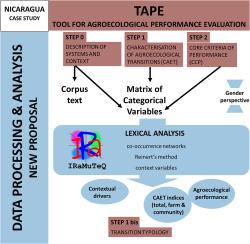Agricultural Systems ( IF 6.1 ) Pub Date : 2023-05-17 , DOI: 10.1016/j.agsy.2023.103686 Verónica Andrea El Mujtar , Ronie Zamor , Francisco Salmerón , Adela del Socorro Guerrero , Luciana Laborda , Pablo Tittonell , Rose Hogan

|
CONTEXT
The Tool for Agroecological Performance Evaluation (TAPE) has been developed to assess the degree of transition to agroecology (Step 1) and the agroecological performance (Step 2) of family farms. However, while methods and indicators for Steps 1 and 2 are well established, the phases of system characterization (Step 0) and the delineation of typologies (Step 1-bis) are not prescribed nor standardised. This results in highly heterogeneous, unstructured and narrative information, subject to the background of the field enumerator. Analytical methods are needed to deal with these, in order to arrive at relevant domains of recommendations for policy and development.
OBJECTIVE
We assessed whether lexical analysis improves the ability of TAPE to elucidate: i) how household characteristics and contextual factors influence such agroecological transitions, ii) whether a high degree of transition to agroecology (Step 1) translates into better agroecological performances (Step 2), and iii) whether data from Step 0 could improve the delineation of transition typologies.
METHODS
We considered 29 rural households located in separate localities across three regions of Nicaragua and analysed the results of applying TAPE to assess their agroecological transition and performance, combining descriptive and lexical analysis. Iramuteq software was used for lexical analysis, including descendent hierarchical classification by Reinert's method and co-occurrence networks. A corpus text based on information provided by desk review and unstructured interviews during Step 0 was used for system description and identification of context variables; while a matrix of categorical variables based on data from Steps 1, 2 and 0 was used to identify agroecological transition typologies.
RESULTS AND CONCLUSIONS
Lexical analysis allowed to summarize data, describe farm systems and identify context drivers (Step 0) and patterns from highly heterogeneous, subjective information. The assessment of agroecological transition (Step 1) and performance (Step 2) indicates that the farms studied were at least in transition to agroecology. Farm-level indicators of agroecological transition were more advanced than community-level indicators. Using Reinert's method we identified two main groups, that cluster seven classes of farms, representing different policy and development intervention targets. The differences detected between farms managed by women or men highlight the relevance of including gender perspective on TAPE analyses.
SIGNIFICANCE
We show that lexical analysis was useful to deal with unstructured, narrative data describing systems and contexts, and for identifying agroecology recommendation domains based on local actors's perspectives.
中文翻译:

在通过 TAPE 向生态农业转型的评估中,词法分析改进了背景驱动因素和农场类型的识别——来自尼加拉瓜农村的案例研究
语境
开发了生态农业绩效评估工具 (TAPE),以评估家庭农场向生态农业转型的程度(第 1 步)和农业生态绩效(第 2 步)。然而,虽然步骤 1 和步骤 2 的方法和指标已经确立,但系统特征化阶段(步骤 0)和类型描述(步骤 1-bis)没有规定也没有标准化。这导致高度异质、非结构化和叙述性的信息,受实地普查员背景的影响。需要分析方法来处理这些问题,以便得出相关领域的政策和发展建议。
客观的
我们评估了词汇分析是否提高了 TAPE 的能力以阐明:i) 家庭特征和背景因素如何影响这种农业生态转型,ii) 向农业生态的高度转型(步骤 1)是否转化为更好的农业生态绩效(步骤 2), iii) 第 0 步的数据是否可以改进过渡类型的描述。
方法
我们考虑了位于尼加拉瓜三个地区不同地点的 29 个农村家庭,结合描述性和词汇分析,分析了应用 TAPE 评估其农业生态转型和绩效的结果。Iramuteq 软件用于词法分析,包括 Reinert 方法和共现网络的后代层次分类。基于步骤 0 期间案头审查和非结构化访谈提供的信息的语料库文本用于系统描述和上下文变量的识别;而基于步骤 1、2 和 0 数据的分类变量矩阵用于识别农业生态转型类型。
结果和结论
词法分析允许总结数据、描述农场系统并从高度异质的主观信息中识别上下文驱动因素(步骤 0)和模式。对生态农业转型(第 1 步)和绩效(第 2 步)的评估表明,所研究的农场至少正在向生态农业转型。农业生态转型的农场级指标比社区级指标更先进。使用 Reinert 的方法,我们确定了两个主要组,将七类农场聚集在一起,代表不同的政策和发展干预目标。在由女性或男性管理的农场之间发现的差异突出了将性别观点纳入 TAPE 分析的相关性。
意义
我们表明,词法分析有助于处理描述系统和背景的非结构化、叙述性数据,以及根据当地参与者的观点确定农业生态学推荐领域。











































 京公网安备 11010802027423号
京公网安备 11010802027423号